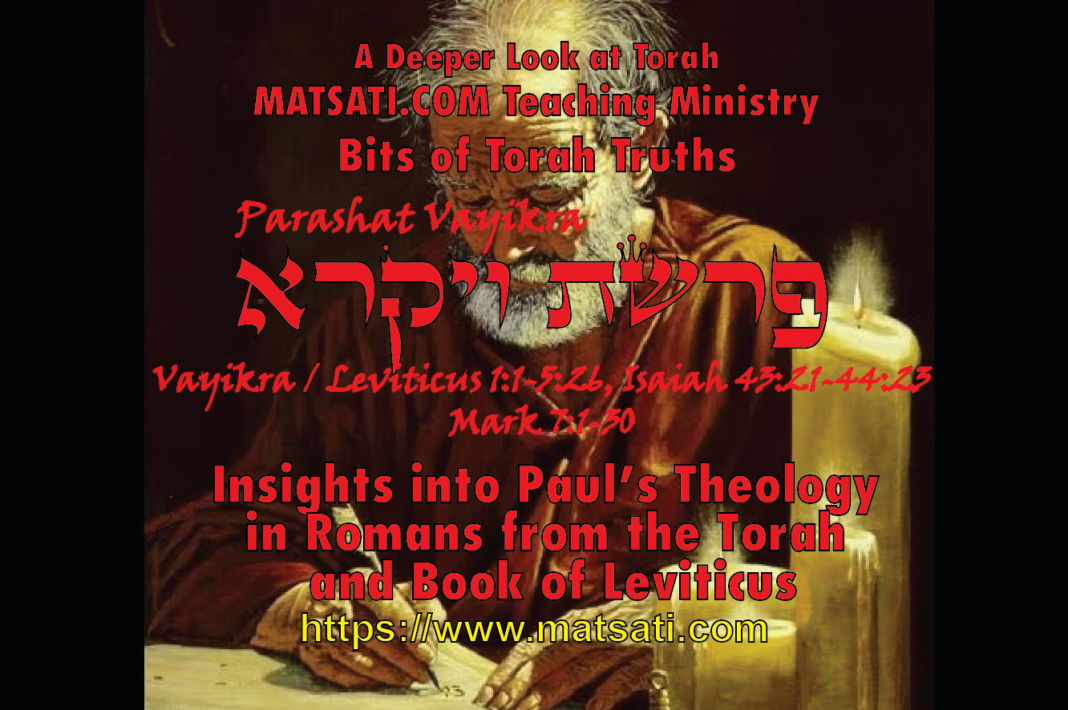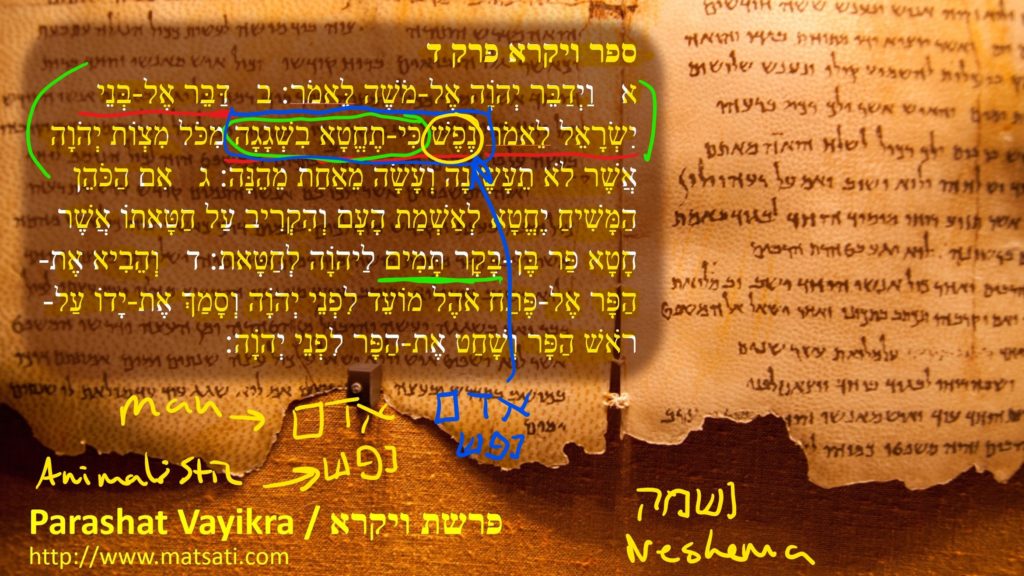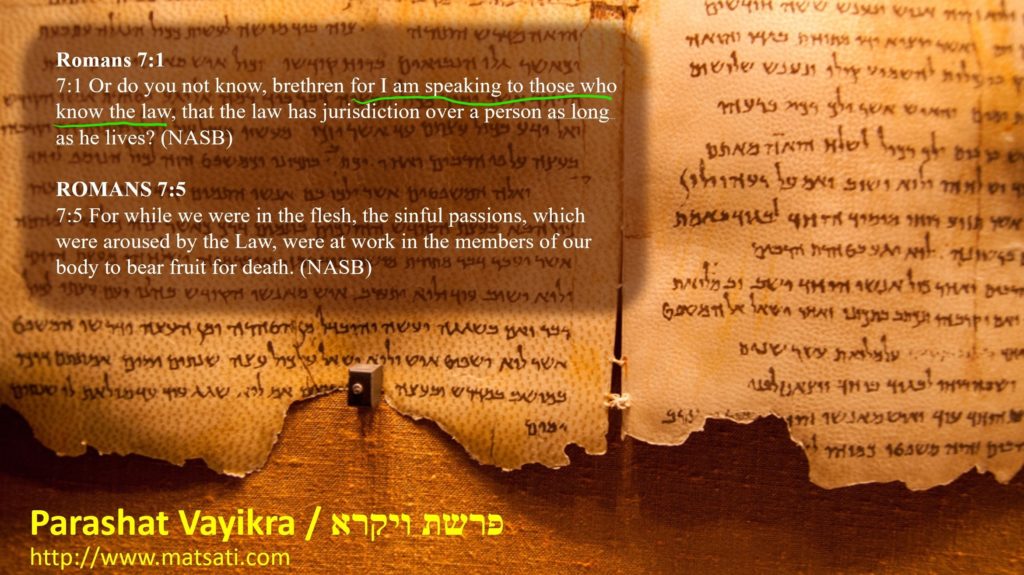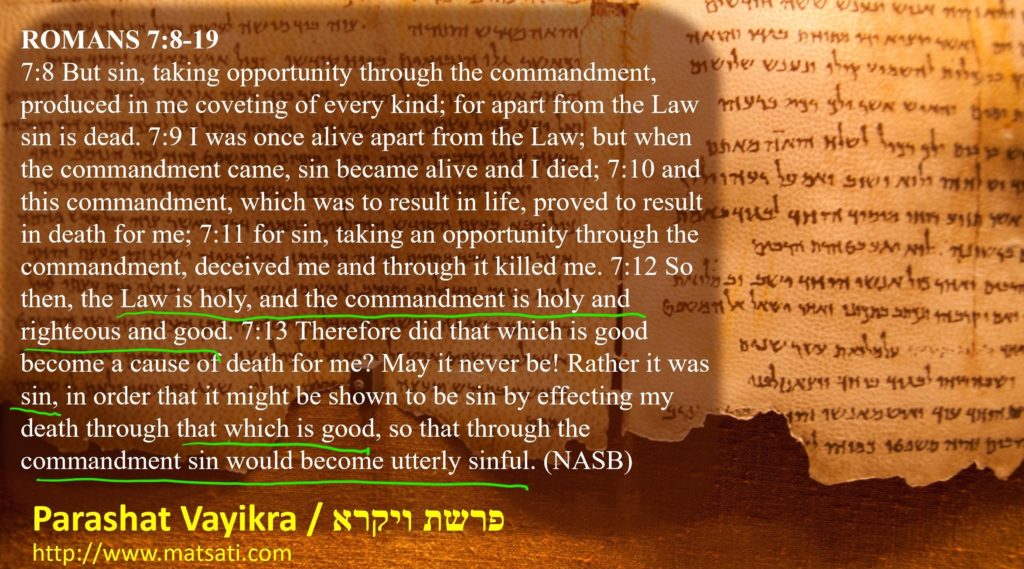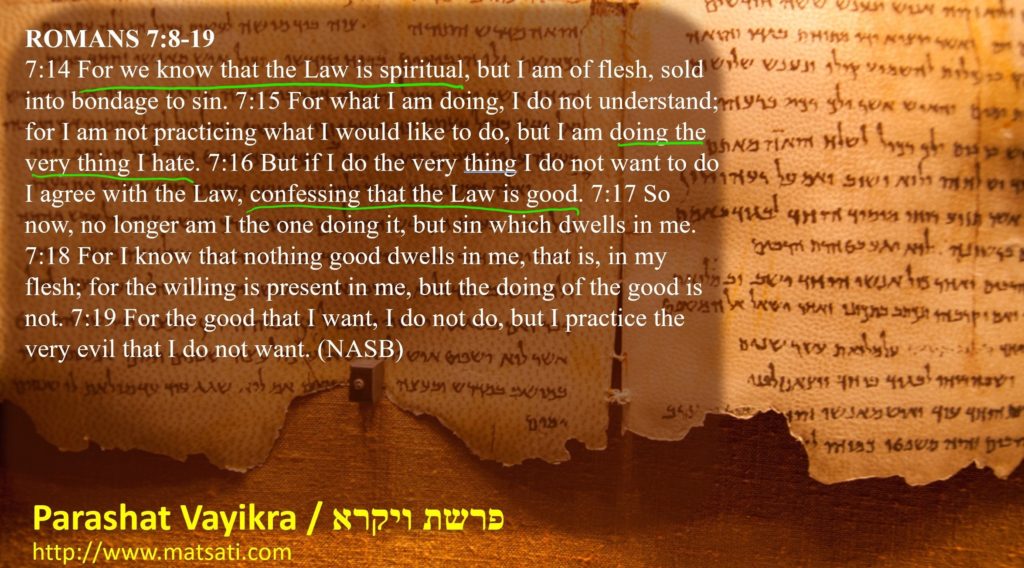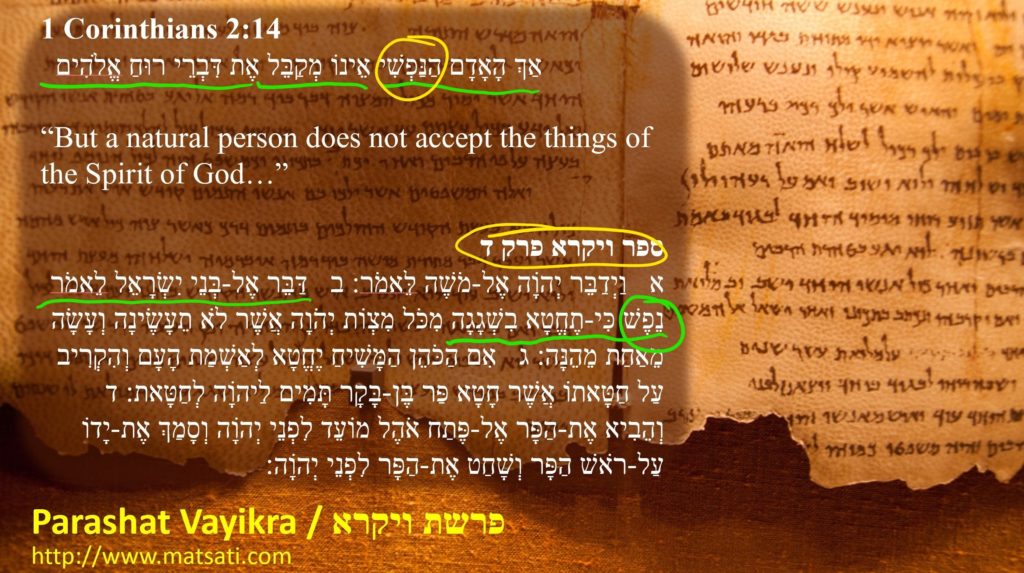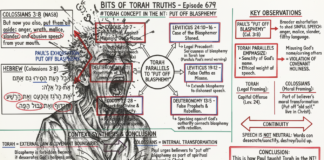This week’s Torah Portion is on the opening verses from the book of Vayikra / Leviticus and is called Parashat Vayikra. The Scriptures this week covers the Torah commands on the Olah Korban (עֹלָה קָרְבָּן, Whole burnt offering, Vayikra / Leviticus 1), the Mincha Korban (מִנְחָה , Grain offerings, Vayikra / Leviticus 2), the Shalamim Korban (שְׁלָמִים קָרְבָּנוֹ, Peace offerings, Vayikra / Leviticus 3), Khatat Korban (חַטָּאת, Sin offerings, Vayikra / Leviticus 4), and the Asham Korban (לְאָשָׁם, Guilt offerings, Vayikra / Leviticus 5). The verses we are particularly interested in looking at are found in Vayikra / Leviticus 4:1-4, א וַיְדַבֵּר יְהוָֹה אֶל-מֹשֶׁה לֵּאמֹר: ב דַּבֵּר אֶל-בְּנֵי יִשְֹרָאֵל לֵאמֹר נֶפֶשׁ כִּי-תֶחֱטָא בִשְׁגָגָה מִכֹּל מִצְוֹת יְהֹוָה אֲשֶׁר לֹא תֵעָשֶֹינָה וְעָשָֹה מֵאַחַת מֵהֵנָּה: ג אִם הַכֹּהֵן הַמָּשִׁיחַ יֶחֱטָא לְאַשְׁמַת הָעָם וְהִקְרִיב עַל חַטָּאתוֹ אֲשֶׁר חָטָא פַּר בֶּן-בָּקָר תָּמִים לַיהוָֹה לְחַטָּאת: ד וְהֵבִיא אֶת-הַפָּר אֶל-פֶּתַח אֹהֶל מוֹעֵד לִפְנֵי יְהוָֹה וְסָמַךְ אֶת-יָדוֹ עַל-רֹאשׁ הַפָּר וְשָׁחַט אֶת-הַפָּר לִפְנֵי יְהוָֹה: 4:1 Then the Lord spoke to Moses, saying, 4:2 ‘Speak to the sons of Israel, saying, ‘If a person sins unintentionally in any of the things which the Lord has commanded not to be done, and commits any of them, 4:3 if the anointed priest sins so as to bring guilt on the people, then let him offer to the Lord a bull without defect as a sin offering for the sin he has committed. 4:4 ‘He shall bring the bull to the doorway of the tent of meeting before the Lord, and he shall lay his hand on the head of the bull and slay the bull before the Lord. (NASB) What is specifically interesting about these verses are when the Lord tells Moshe, דַּבֵּר אֶל-בְּנֵי יִשְֹרָאֵל לֵאמֹר נֶפֶשׁ כִּי-תֶחֱטָא בִשְׁגָגָה “speak to the children of Israel saying, the soul that sins בִשְׁגָגָה / unwittingly / unintentionally…” This is a significant point as the Lord is saying that a sacrifice does not qualify if one intentionally sins. This is also how the Jewish commentaries interpret these verses.
Chizkuni, Vayikra / Leviticus 4:2 Part 1
כי תחטא בשגגה, “if you transgress a law inadvertently; sin offerings as a form of atonement are acceptable only when that sin had not been committed deliberately. Deliberately committed sins cannot be atoned for by that method. [There are some exceptions. Ed.]
The act of deliberate sin with the assumption that one can bring a sacrifice, the Torah explains to us that there is no atonement in this case. This is what the author of the book of Hebrews was talking about according to Hebrews 10:26-29, “For if we go on sinning willfully after receiving the knowledge of the truth, there no longer remains a sacrifice for sins, but a terrifying expectation of judgment and the fury of a fire which will consume the adversaries. Anyone who has set aside the Law of Moses dies without mercy on the testimony of two or three witnesses. How much severer punishment do you think he will deserve who has trampled under foot the Son of God, and has regarded as unclean the blood of the covenant by which he was sanctified, and has insulted the Spirit of grace?” (NASB) The idea here is when one is intentional in his/her sin there is only the fear of punishment due to there being no possibility for atonement. The point is that one must truly be repentant and perform Teshuvah (turning from sin) before one can bring a valid sacrifice for atonement. Based upon what the author of the book of Hebrews is saying, repentance and Teshuvah also qualify the sacrifice of Yeshua and the blood of the covenant. This indeed is a significant point Vayikra / Leviticus is making in the Torah.
The Scriptures we are looking at for this week are from Vayikra / Leviticus 4:1-20.
ספר ויקרא פרק ד
א וַיְדַבֵּר יְהוָֹה אֶל-מֹשֶׁה לֵּאמֹר: ב דַּבֵּר אֶל-בְּנֵי יִשְֹרָאֵל לֵאמֹר נֶפֶשׁ כִּי-תֶחֱטָא בִשְׁגָגָה מִכֹּל מִצְוֹת יְהֹוָה אֲשֶׁר לֹא תֵעָשֶֹינָה וְעָשָֹה מֵאַחַת מֵהֵנָּה: ג אִם הַכֹּהֵן הַמָּשִׁיחַ יֶחֱטָא לְאַשְׁמַת הָעָם וְהִקְרִיב עַל חַטָּאתוֹ אֲשֶׁר חָטָא פַּר בֶּן-בָּקָר תָּמִים לַיהוָֹה לְחַטָּאת: ד וְהֵבִיא אֶת-הַפָּר אֶל-פֶּתַח אֹהֶל מוֹעֵד לִפְנֵי יְהוָֹה וְסָמַךְ אֶת-יָדוֹ עַל-רֹאשׁ הַפָּר וְשָׁחַט אֶת-הַפָּר לִפְנֵי יְהוָֹה: ה וְלָקַח הַכֹּהֵן הַמָּשִׁיחַ מִדַּם הַפָּר וְהֵבִיא אֹתוֹ אֶל-אֹהֶל מוֹעֵד: ו וְטָבַל הַכֹּהֵן אֶת-אֶצְבָּעוֹ בַּדָּם וְהִזָּה מִן-הַדָּם שֶׁבַע פְּעָמִים לִפְנֵי יְהֹוָה אֶת-פְּנֵי פָּרֹכֶת הַקֹּדֶשׁ: ז וְנָתַן הַכֹּהֵן מִן-הַדָּם עַל-קַרְנוֹת מִזְבַּח קְטֹרֶת הַסַּמִּים לִפְנֵי יְהֹוָה אֲשֶׁר בְּאֹהֶל מוֹעֵד וְאֵת | כָּל-דַּם הַפָּר יִשְׁפֹּךְ אֶל-יְסוֹד מִזְבַּח הָעֹלָה אֲשֶׁר-פֶּתַח אֹהֶל מוֹעֵד: ח וְאֶת-כָּל-חֵלֶב פַּר הַחַטָּאת יָרִים מִמֶּנּוּ אֶת-הַחֵלֶב הַמְכַסֶּה עַל-הַקֶּרֶב וְאֵת כָּל-הַחֵלֶב אֲשֶׁר עַל-הַקֶּרֶב: ט וְאֵת שְׁתֵּי הַכְּלָיֹת וְאֶת-הַחֵלֶב אֲשֶׁר עֲלֵיהֶן אֲשֶׁר עַל-הַכְּסָלִים וְאֶת-הַיֹּתֶרֶת עַל-הַכָּבֵד עַל-הַכְּלָיוֹת יְסִירֶנָּה: י כַּאֲשֶׁר יוּרָם מִשּׁוֹר זֶבַח הַשְּׁלָמִים וְהִקְטִירָם הַכֹּהֵן עַל מִזְבַּח הָעֹלָה: יא וְאֶת-עוֹר הַפָּר וְאֶת-כָּל-בְּשָֹרוֹ עַל-רֹאשׁוֹ וְעַל-כְּרָעָיו וְקִרְבּוֹ וּפִרְשׁוֹ: יב וְהוֹצִיא אֶת-כָּל-הַפָּר אֶל-מִחוּץ לַמַּחֲנֶה אֶל-מָקוֹם טָהוֹר אֶל-שֶׁפֶךְ הַדֶּשֶׁן וְשָֹרַף אֹתוֹ עַל-עֵצִים בָּאֵשׁ עַל-שֶׁפֶךְ הַדֶּשֶׁן יִשָּׂרֵף: פ יג וְאִם כָּל-עֲדַת יִשְֹרָאֵל יִשְׁגּוּ וְנֶעְלַם דָּבָר מֵעֵינֵי הַקָּהָל וְעָשֹוּ אַחַת מִכָּל-מִצְוֹת יְהוָֹה אֲשֶׁר לֹא-תֵעָשֶֹינָה וְאָשֵׁמוּ: יד וְנוֹדְעָה הַחַטָּאת אֲשֶׁר חָטְאוּ עָלֶיהָ וְהִקְרִיבוּ הַקָּהָל פַּר בֶּן-בָּקָר לְחַטָּאת וְהֵבִיאוּ אֹתוֹ לִפְנֵי אֹהֶל מוֹעֵד: טו וְסָמְכוּ זִקְנֵי הָעֵדָה אֶת-יְדֵיהֶם עַל-רֹאשׁ הַפָּר לִפְנֵי יְהוָֹה וְשָׁחַט אֶת-הַפָּר לִפְנֵי יְהוָֹה: טז וְהֵבִיא הַכֹּהֵן הַמָּשִׁיחַ מִדַּם הַפָּר אֶל-אֹהֶל מוֹעֵד: יז וְטָבַל הַכֹּהֵן אֶצְבָּעוֹ מִן-הַדָּם וְהִזָּה שֶׁבַע פְּעָמִים לִפְנֵי יְהֹוָה אֶת-פְּנֵי הַפָּרֹכֶת: יח וּמִן-הַדָּם יִתֵּן | עַל-קַרְנֹת הַמִּזְבֵּחַ אֲשֶׁר לִפְנֵי יְהֹוָה אֲשֶׁר בְּאֹהֶל מוֹעֵד וְאֵת כָּל-הַדָּם יִשְׁפֹּךְ אֶל-יְסוֹד מִזְבַּח הָעֹלָה אֲשֶׁר-פֶּתַח אֹהֶל מוֹעֵד: יט וְאֵת כָּל-חֶלְבּוֹ יָרִים מִמֶּנּוּ וְהִקְטִיר הַמִּזְבֵּחָה: כ וְעָשָֹה לַפָּר כַּאֲשֶׁר עָשָֹה לְפַר הַחַטָּאת כֵּן יַעֲשֶֹה-לּוֹ וְכִפֶּר עֲלֵהֶם הַכֹּהֵן וְנִסְלַח לָהֶם:
Vayikra / Leviticus 4:1-20
4:1 Then the Lord spoke to Moses, saying, 4:2 ‘Speak to the sons of Israel, saying, ‘If a person sins unintentionally in any of the things which the Lord has commanded not to be done, and commits any of them, 4:3 if the anointed priest sins so as to bring guilt on the people, then let him offer to the Lord a bull without defect as a sin offering for the sin he has committed. 4:4 ‘He shall bring the bull to the doorway of the tent of meeting before the Lord, and he shall lay his hand on the head of the bull and slay the bull before the Lord. 4:5 ‘Then the anointed priest is to take some of the blood of the bull and bring it to the tent of meeting, 4:6 and the priest shall dip his finger in the blood and sprinkle some of the blood seven times before the Lord, in front of the veil of the sanctuary. 4:7 ‘The priest shall also put some of the blood on the horns of the altar of fragrant incense which is before the Lord in the tent of meeting; and all the blood of the bull he shall pour out at the base of the altar of burnt offering which is at the doorway of the tent of meeting. 4:8 ‘He shall remove from it all the fat of the bull of the sin offering: the fat that covers the entrails, and all the fat which is on the entrails, 4:9 and the two kidneys with the fat that is on them, which is on the loins, and the lobe of the liver, which he shall remove with the kidneys 4:10 (just as it is removed from the ox of the sacrifice of peace offerings), and the priest is to offer them up in smoke on the altar of burnt offering. 4:11 ‘But the hide of the bull and all its flesh with its head and its legs and its entrails and its refuse, 4:12 that is, all the rest of the bull, he is to bring out to a clean place outside the camp where the ashes are poured out, and burn it on wood with fire; where the ashes are poured out it shall be burned. 4:13 ‘Now if the whole congregation of Israel commits error and the matter escapes the notice of the assembly, and they commit any of the things which the Lord has commanded not to be done, and they become guilty; 4:14 when the sin which they have committed becomes known, then the assembly shall offer a bull of the herd for a sin offering and bring it before the tent of meeting. 4:15 ‘Then the elders of the congregation shall lay their hands on the head of the bull before the Lord, and the bull shall be slain before the Lord. 4:16 ‘Then the anointed priest is to bring some of the blood of the bull to the tent of meeting; 4:17 and the priest shall dip his finger in the blood and sprinkle it seven times before the Lord, in front of the veil. 4:18 ‘He shall put some of the blood on the horns of the altar which is before the Lord in the tent of meeting; and all the blood he shall pour out at the base of the altar of burnt offering which is at the doorway of the tent of meeting. 4:19 ‘He shall remove all its fat from it and offer it up in smoke on the altar. 4:20 ‘He shall also do with the bull just as he did with the bull of the sin offering; thus he shall do with it. So the priest shall make atonement for them, and they will be forgiven.
There are a good number of things we can learn from this week’s Torah Portion that are found in the Apostolic Writings, Vayikra / Leviticus 4:1-4, א וַיְדַבֵּר יְהוָֹה אֶל-מֹשֶׁה לֵּאמֹר: ב דַּבֵּר אֶל-בְּנֵי יִשְֹרָאֵל לֵאמֹר נֶפֶשׁ כִּי-תֶחֱטָא בִשְׁגָגָה מִכֹּל מִצְוֹת יְהֹוָה אֲשֶׁר לֹא תֵעָשֶֹינָה וְעָשָֹה מֵאַחַת מֵהֵנָּה: 4:1 Then the Lord spoke to Moses, saying, 4:2 ‘Speak to the sons of Israel, saying, ‘If a person sins unintentionally in any of the things which the Lord has commanded not to be done, and commits any of them, (NASB) One of these things specifically comes from studying the Hebrew text, which illustrates the importance of going to the original languages and studying the Torah (Law of Moshe). One of the interesting aspects of the rabbinic commentaries is how the rabbis tend to draw out certain spiritual insights that the Christian commentaries do not. Take for example the significance of what Daat Zkenim is saying about Vayikra / Leviticus 4:2 and specifically what is drawn out from the Hebrew text!
Daat Zkenim on Vayikra / Leviticus 4:2 Part 1
נפש כי תחטא בשגגה, “if someone commits a sin inadvertently;” it is noteworthy that the verse does not commence with the word: אדם, “a human being,” as it does in Genesis chapter one verse two, where it describes someone feeling the urge to offer a sacrifice to the Lord. When the prophet Ezekiel in Ezekiel 18,4, writes about the same subject, he too commences by referring to the subject as נפש, i.e. the animalistic part of our soul. The point that is being made in both these verses is that a sin can only be the product of the animalistic life force in our body, not the spiritual part that G–d blew into Adam’s nostrils when the result was his becoming a human being, אדם. (Compare Genesis 2,7 where he is then described as נפש חיה, “a living creature,” not just as נפש.) The creature described as נפש, is by definition mortal, as is clear from the verse quoted from Ezekiel 18,4, where the prophet concludes with the word: תמות, “it is bound to die.” Consider the following parable: two subjects had each committed a trespass against their king. One is an ordinary citizen, whereas the second one was one of the people engaged by the palace where he made his living. They were both arraigned for judgment. The King decreed that the ordinary citizen was to be released forthwith, whereas he imposed a painful penalty for the member of the palace staff who had committed a similar offence. The other members of the palace staff were very disturbed when they observed that their colleague had been singled out for harsher punishment. They questioned the king about this. The King told them that the first citizen, being a stranger, was not familiar with the good qualities of the king. He could therefore be forgiven for having committed this trespass. The palace employees, however, who were well aware of all the king had done for them, could not be forgiven for having trespassed against his rules instead of being especially careful not to commit such an offence. The same applies to creatures who possess only a body, i.e. who though human, did not have a Divine soul, which made them part of the heavenly regions, i.e. they are part of the staff of G–d’s Palace. They are charged with ensuring that their “uniform,” the soul, is in a state of purity at all times. As a result of this difference, the bodies who did not receive a נשמה, a soul from heaven, when they die are buried and this is all. Human beings endowed with a heavenly soul, however, come up for judgment to determine if the G–d given soul is being returned in the condition it had been given to them.
Daat Zekhenim is looking specifically at the phrase here, נֶפֶשׁ כִּי-תֶחֱטָא בִשְׁגָגָה מִכֹּל מִצְוֹת יְהֹוָה אֲשֶׁר לֹא תֵעָשֶֹינָה and focusing upon the way the Hebrew text is written pointing out how God uses the word נֶפֶשׁ rather than אדם a term used as reference to a generalized human being. In the rabbinic assessment of the creation account, it is a good exercise to look at what the rabbis have to say when God breathed life into Eve. (Sefaria.org) On the creation of the woman, the rabbis contrast the concept of the נֶפֶשׁ (nefesh) and the נשמה (neshamah). Here Daat Zekhenim draws into the narrative the נֶפֶשׁ and the נשמה in relation to the sin sacrifice and whether one’s sin was intentional or unintentional and the validity of the Korban that is brought. The rabbis speak of the נֶפֶשׁ as being known as the animalistic part of one’s soul, whereas the נשמה (neshamah) is the spiritual part that was imparted to us when God breathed life into man (note neshamah was the Hebrew word used to describe the act of breathing into us life). The reason that the word נֶפֶשׁ is being used here in Vayikra / Leviticus 4:2 is due to what exactly God is revealing to us from the Torah concerning the Sin sacrifice. Here the body is described as the נֶפֶשׁ and the spirit is described as the נשמה and according to the Torah, when the body / soul / נֶפֶשׁ sins, the Torah is speaking of the body and not the spirit, that which is given from God.
These things parallel something Paul was teaching according to Romans chapter 7. Note what Paul writes in the opening verse Romans 7:1 Or do you not know, brethren for I am speaking to those who know the law, that the law has jurisdiction over a person as long as he lives? (NASB) Paul makes a point to specifically point out that he is speaking to those who know the Torah. This is very important as not knowing the Torah one may not understand what follows! Note also while reading through Romans 7, Paul speaks of four laws and parallels the law of the body/flesh to sin and the law of the spirit to Torah. Again, all of these initial observations are very important as it relates to properly understanding the remainder of Romans 7. The specific verses that are related to our text for this week’s Torah Portion are from Romans 7:5 and 7:8-19:
Romans 7:5
7:5 For while we were in the flesh, the sinful passions, which were aroused by the Law, were at work in the members of our body to bear fruit for death. (NASB)
Romans 7:8-19
7:8 But sin, taking opportunity through the commandment, produced in me coveting of every kind; for apart from the Law sin is dead. 7:9 I was once alive apart from the Law; but when the commandment came, sin became alive and I died; 7:10 and this commandment, which was to result in life, proved to result in death for me; 7:11 for sin, taking an opportunity through the commandment, deceived me and through it killed me. 7:12 So then, the Law is holy, and the commandment is holy and righteous and good. 7:13 Therefore did that which is good become a cause of death for me? May it never be! Rather it was sin, in order that it might be shown to be sin by effecting my death through that which is good, so that through the commandment sin would become utterly sinful. 7:14 For we know that the Law is spiritual, but I am of flesh, sold into bondage to sin. 7:15 For what I am doing, I do not understand; for I am not practicing what I would like to do, but I am doing the very thing I hate. 7:16 But if I do the very thing I do not want to do I agree with the Law, confessing that the Law is good. 7:17 So now, no longer am I the one doing it, but sin which dwells in me. 7:18 For I know that nothing good dwells in me, that is, in my flesh; for the willing is present in me, but the doing of the good is not. 7:19 For the good that I want, I do not do, but I practice the very evil that I do not want. (NASB)
Paul’s statement 7:14 For we know that the Law is spiritual, but I am of flesh, sold into bondage to sin. (NASB) draws in this concept and contrasting differences between the נֶפֶשׁ (nefesh) and the נשמה (neshamah). What Paul is speaking about here parallels the Torah portion from Vayikra / Leviticus which states, נֶפֶשׁ כִּי-תֶחֱטָא בִשְׁגָגָה מִכֹּל מִצְוֹת יְהֹוָה אֲשֶׁר לֹא תֵעָשֶֹינָה coupled with what Daat Zekenim discussing from the Hebrew text for why God used the word נֶפֶשׁ rather than אדם. Paul writes in Romans 7:5 that being in the flesh the sinful passions were aroused by the Torah. He goes on to say that being in the flesh he was sold to bondage to sin. This parallels the rabbinic understanding of the נֶפֶשׁ as being known as the animalistic part of one’s soul, whereas the נשמה (neshamah) is the spiritual part that was imparted to us when God breathed life into man. The animalistic part of the soul wants to sin, whereas the spiritual part of our soul נשמה does not. Notice this is exactly what Paul is saying according to 1 Corinthians 2:14, אַךְ הָאָדָם הַנַּפְשִׁי אֵינוֹ מְקַבֵּל אֶת דִּבְרֵי רוּחַ אֱלֹהִים “But a natural person does not accept the things of the Spirit of God…” and the NASB translates this as “the natural man” as the Hebrew NT is translating as הַנַּפְשִׁי which is exactly what is being explained in the rabbinic commentary. This is also how Paul concludes saying the following, 7:16 But if I do the very thing I do not want to do I agree with the Law, confessing that the Law is good. 7:17 So now, no longer am I the one doing it, but sin which dwells in me. 7:18 For I know that nothing good dwells in me, that is, in my flesh; for the willing is present in me, but the doing of the good is not. 7:19 For the good that I want, I do not do, but I practice the very evil that I do not want. (NASB) Here Paul is convolution two worlds, one that is physical and one that is spiritual to our struggle with sin. Note how the rabbinic narrative demonstrates that Paul was consistent with the Torah in Vayikra / Leviticus 4. We note how Paul was also trying to explain these things to a people who did not know the Torah (i.e. the Romans). In addition, Paul is driving through the point of the challenge and struggle that we have as the children of God having His Spirit dwelling in our hearts, and yet living in this world and this body which wants to sin and is at war with the spirit God has given us.
There is also one additional thing that we can learn concerning the verse from Vayikra / Leviticus 4:2. The Talmud Bavli has some to say concerning these things:
Talmud Bavli Keritot 3a:26
The Gemara elaborates that this is as it is taught in a baraita: The verse states: “And performs from one of them.” This teaches that there are times when one is liable to bring one sin offering for all of his transgressions, and there are times when one is liable to bring a sin offering for each and every transgression. And it is further taught in a baraita: There is “one [aḥat],” i.e., the transgression of one prohibition, which is like “them [hena],” i.e., many unwitting transgressions, in that one is liable to bring multiple sin offerings. How so? When one performs many labors where his action was intentional with regard to Shabbat but his action was unwitting with regard to the prohibited labors, he brings multiple sin offerings.
Notice the significance of what the Gemara is saying concerning this verse. The rabbis say that this teaches us that there are times when one is liable to bring one sin offering for all his/her transgressions, and there are times when one is liable to bring a sin offering for each and every transgression. This is the point that the author of the book of Hebrews is drawing out saying, Hebrews 10:10 By this will we have been sanctified through the offering of the body of Jesus Christ once for all. 10:11 Every priest stands daily ministering and offering time after time the same sacrifices, which can never take away sins; 10:12 but He, having offered one sacrifice for sins for all time, sat down at the right hand of God, 10:13 waiting from that time onward until His enemies be made a footstool for His feet. 10:14 For by one offering He has perfected for all time those who are sanctified. 10:15 And the Holy Spirit also testifies to us; for after saying, 10:16 ‘This is the covenant that I will make with them After those days, says the Lord: I will put My laws upon their heart, And on their mind I will write them,’ He then says, 10:17 ‘And their sins and their lawless deeds I will remember no more.’ (NASB) This is the aspect of the sin offering the author of Hebrews is making concerning what Yeshua did on our behalf, dying once and for all. Note again how these things that are written are not nullifying the Torah command. The NT text was written to be consistent with Torah and not as nullifying the Torah! These things also reminds us how important it is for us to study the Torah and all of Scriptures, so that we are able to properly understand, interpret, teach, and apply God’s word to our lives! (2 Timothy 2:15)
